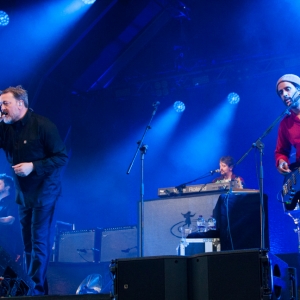Report
-
Recently Browsing 0 members
- No registered users viewing this page.
-
Latest Activity
-
By steviewevie · Posted
Freddie Hayward from New Statesman's take The best way to understand Donald Trump’s second inaugural address is to compare it with his first. Eight years ago, Trump railed against what he called the “carnage” which globalisation had wrought upon ordinary Americans. The destruction of communities through deindustrialisation. The smug deceit of elites who thought their own wealth meant the economy was working for everyone else. He spoke of “mothers and children trapped in poverty”, “rusted-out factories”, and promised to stop jobs going overseas. “The forgotten men and women of our country will be forgotten no longer,” he warned. “We are transferring power from Washington, DC, and giving it back to you, the American people.” The speech was pilloried at the time as dark and sinister; George W Bush said it was “some crazy sh*t” to those sat around him on the dais. But watching it back eight years later, the talking points are almost banal. Even oblivious liberals now reluctantly admit that globalisation is flawed, deindustrialisation was painful and ordinary people have been ignored. But back then it was an unfamiliar message for a US president to deliver; parts of it could’ve been spoken by Bernie Sanders. That speech was written by Steve Bannon who became a senior aide in Trump’s White House. But Bannon’s influence has dwindled since 2017. The Maga movement is now split between the populist nationalists under Bannon and the techno-futurists represented by Elon Musk. Trump’s second inauguration in comparison with his first shows that power in Trump world has shifted towards tech bros, leaving the populists with little to celebrate. It wasn’t only that the tech oligarchy – most notably Musk, Jeff Bezos and Mark Zuckerberg – was intermingled with Trump’s family on the dais. The entire inaugural weekend in DC was a symbol for the dominance of the haves over the have-nots. Billionaires competed to host the most extravagant celebrations. Parties were held on superyachts with unlimited Veuve Clicquot. The corporate class sees nothing but opportunity: “[The Trump team] are extremely receptive,” one grinning executive at a big American company told me. Donors in black tie gingerly crossed the iced-over pavements and made their way into the Capitol Building, while the working-class people who travelled from across the country realised they would not be able to see the president speak. Inside the Capitol Rotunda, Trump was surrounded by the elite while his ordinary supporters remained outside in the cold. Those ordinary people, who featured so heavily in Trump’s address eight years ago, were substituted in his 2025 speech for a rapacious belief in American greatness. “I return to the presidency confident and optimistic that we are at the start of a thrilling new era of national success,” he said, “the golden age of America begins right now.” His remark that his election meant “sunlight is pouring over the entire world” made Tony Blair’s “new dawn has broken, has it not?” look modest. Indeed, Trump’s messianic belief in his own power to recast the future is rooted in the techno-optimism spouted by the billionaires behind him. “I was saved by God to make America great again,” Trump said, referring to the assassination attempt in Pennsylvania last year. The focus on strength, growth and capitalism made the speech more American than 2017’s lament about poverty. Trump said he wanted to lead America to the next frontier. In his new telling, America is already great and will only become greater under his leadership. According to Trump, this means the country has incomparable power to overwhelm other nations and control the Western hemisphere. He explicitly called for the US to become a nation which “expands our territory” once again. Nowhere is that expansionism more relevant than in his remarks about space. “We will pursue our manifest destiny into the stars, launching American astronauts to plant the stars and stripes on the planet Mars,” Trump said. Musk, whose defining mission is to colonise Mars, raised a double thumbs up when he heard the line. This is the return of American exceptionalism. Economic populism has been replaced by a belief that elites should be leading America’s resurgence. Tariffs, which are the keystone of protectionism, were relegated to a sentence or two. Liberals will be offended by the indecorous tone of Trump’s speech, but the content is less threatening to the established political and economic order than what he said he wanted to do in 2017. Billionaires such as Musk have been urging politicians to forget about wealth inequality, unleash technology and promote American greatness for years. Today they got what they wanted. -
By Crazyfool01 · Posted
sadly at the moment its the only way of embedding info on this site and ive already asked iggy .... hoping forum upgrades sort that ..... I guess probably a better way in future is to screenshot .. -
By northernangel · Posted
Ah I don't know about the court date. I don't agree that SOAD would generate that heavy interest. The difference is back 2017 as you say, those acts still did. -
By Superscally · Posted
It's more fun just doing it on your own, just going where you want... -
By Euphoricape · Posted
Anyone still using twitter needs to have a word with themselves. The owner is literally giving nazi salutes on the world stage and seemingly getting away with it.
-
-
Latest Festival News
-
Featured Products
-

Monthly GOLD Membership - eFestivals Ad-Free
2.49 GBP/month
-
-
Hot Topics
-
Latest Tourdates













